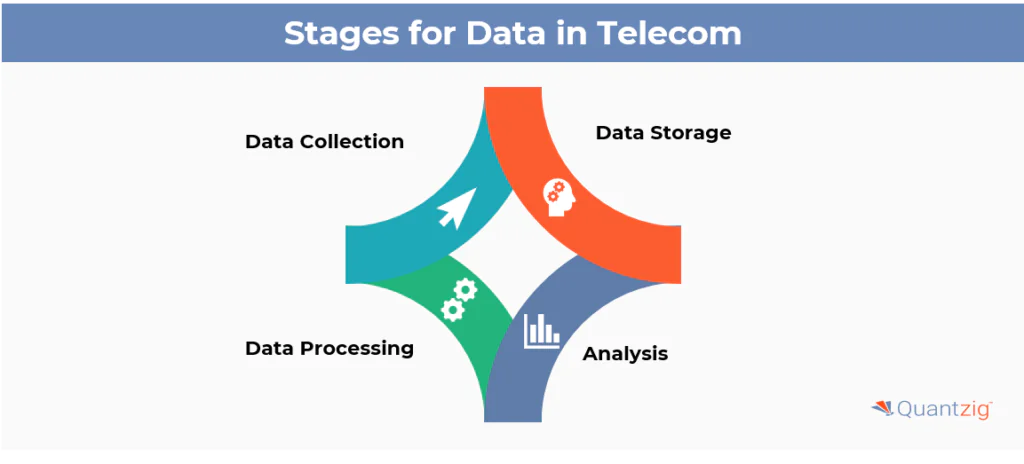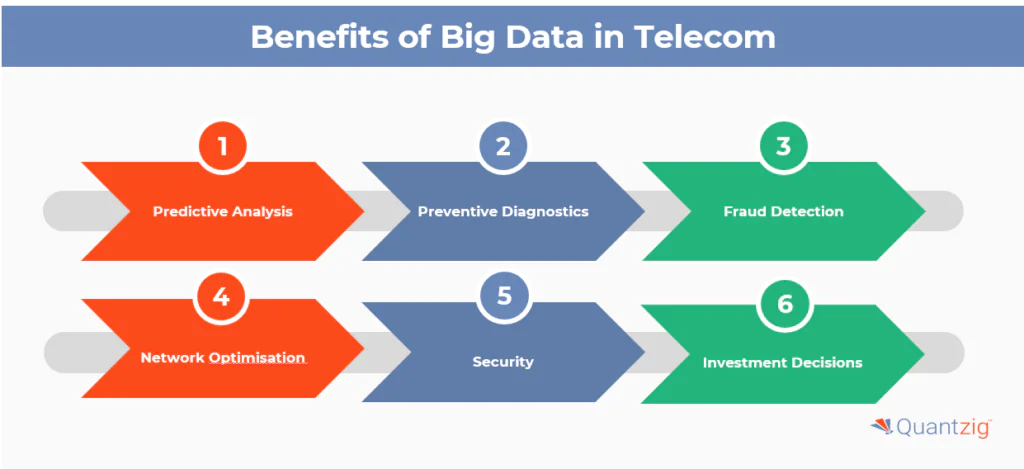The telecom sector has seen stagnant growth in recent years due to declining revenues from voice-based services, with a shift towards data usage. However, technological innovations, including 4G and 5G technologies and IoT integration, have been remarkable. The global subscriber base is expected to reach 5.6 billion, raising questions about the industry’s capacity to handle such numbers. Telecommunications companies face challenges like network outages, line damage, and congestion.
To gain a competitive advantage, telecom providers are leveraging big data technologies to analyze customer call records, social groups, and demographics. By using predictive analytics, artificial intelligence (AI), and machine learning, they aim to enhance customer satisfaction and loyalty. Personalized marketing campaigns and flexible offerings help reduce customer churn prevention. However, managing the vast amounts of data collected remains a significant challenge for data engineering in the telecom industry.
Book a demo to experience the meaningful insights we derive from data through our analytical tools and platform capabilities. Schedule a demo today!
Request a free demoTable of Contents
Big Data Challenges in the Telecom Industry
At present, the world generates more data in just two days through internet browsing than it did in decades past. Consider the vast volumes of data from sources like smart homes, cars, on-demand videos, streaming apps, gaming, and various daily entertainment and educational applications. Telecom companies must gather this immense data, analyze it, and disseminate insights across diverse databases. This dynamic fuels the expansion of the big data market.
High Capital Expenditure
Anyone working in the telecom industry would tell you that the capital expenditure demand due to data growth is their biggest challenge as of yet. This problem arises due to changing trends in the consumption of data services over voice services. For instance, instead of making calls and texting people prefer WhatsApp and Skype, driving the growth in data traffic and bandwidth usage. To cater to such demands, telecom operators have to invest hugely in infrastructure and also strive for cost efficiency. The operators should also invest in infrastructure to facilitate big data analytics.
Big data revolutionizes the telecom industry by enabling personalized marketing, improving service quality, and optimizing network performance. Telecom companies leverage big data analytics to understand customer behavior, target marketing campaigns effectively, and detect and prevent fraud. This data-driven approach enhances customer satisfaction, reduces churn, and informs strategic decision-making. Through advanced analytics, telecom firms streamline operations, prioritize network capacity adjustments, and innovate product offerings. Big data also facilitates partnerships, monetization opportunities, and the development of location-based services, driving efficiency and competitiveness in a rapidly evolving telecommunications market.
Network Analytics
Network monitoring products deliver value to players in the telecom industry by collecting data from the network, analyzing it, and presenting actionable insights to the network manager. It helps optimize the network, reduce downtime, and improve overall efficiency. To embrace big data technologies, many network operators are choosing to apply advanced analytics to network data to gain more valuable insights. The most significant big data challenges in doing so involve the process and political issues in sharing data efficiently with relevant stakeholders and dealing with uncooperative vendors.
Data Storage Issues
The global unique subscriber base in the telecom sector was close to 5 million in 2016. The increase in 3G and 4G subscriptions will generate more content and user data, leading to big data challenges for telecommunications companies. These challenges include storing vast amounts of information, implementing automated data migration strategies, and tiered storage data management to reduce costs. Effective data engineering and the use of artificial intelligence (AI), predictive analytics, and machine learning are essential for improving customer satisfaction and customer churn prevention.
Integrating IoT
Telecommunications companies face big data challenges with the proliferation of IoT devices such as refrigerators, speakers, sound systems, and temperature control systems. In the telecom sector, collaboration with companies like IBM, GE, Deloitte, and Intel is essential. Leveraging artificial intelligence (AI), predictive analytics, data engineering, and machine learning is crucial for improving customer satisfaction and preventing customer churn.
Experience the advantages firsthand by testing a customized complimentary pilot designed to address your specific requirements. Pilot studies are non-committal in nature.
Request a free pilotBenefits of exploring big data in the telecom
Preventive Diagnostics:
Big data enables telecom companies to implement preventive diagnostics by analyzing equipment operation data to detect anomalies and potential issues before they escalate into failures.
Predictive Analytics:
By leveraging big data analytics, telecom companies can predict equipment failures by analyzing the causes of failure, leading to more efficient maintenance schedules and reduced downtime.
Fraud Detection:
Big data analytics help in detecting and preventing fraud by analyzing user-profiles and identifying suspicious patterns in network activity that may indicate fraudulent behavior.
Network Optimization:
Telecom companies utilize big data to optimize network performance by analyzing real-time network activity and capacity demand, enabling them to allocate resources effectively and ensure smooth service delivery.
Security:
Big data analytics help in enhancing security by detecting and mitigating threats from hackers and unauthorized access to private information, thus safeguarding the network against potential breaches.
Investment Decisions:
Using big data monitoring software and integration with ERPs (Enterprise Resource Planning systems), telecom companies can make informed investment decisions by analyzing data on network failure, congestion, and performance, ensuring optimal utilization of resources and maximizing returns on investments.
How Quantzig can help in overcoming telecom industry challenges?
Quantzig, as a data analytics and consulting firm, can help the telecom industry overcome various challenges through its expertise in data-driven solutions and industry-specific knowledge. Here’s how Quantzig can assist in addressing some key challenges faced by the telecom sector:
1. Network Optimization and Performance Management:
Quantzig leverages advanced data analytics techniques to analyze network performance, identify bottlenecks, predict potential failures, and optimize network resources. By analyzing network traffic patterns and subscriber behavior, Quantzig helps telecom companies with network optimization to enhance performance, reliability, and quality of service. This approach supports risk mitigation and improves data quality through data integration from various data sources. Quantzig’s use of AI and ML (Artificial Intelligence and Machine Learning) promotes data maturity in the telecom industry.
2. Customer Experience Management:
Quantzig can analyze customer data from various data sources, including call records, service interactions, and social media, to gain insights into customer preferences, behavior, and satisfaction levels. By understanding customer needs and preferences, Quantzig can help the telecom industry personalize marketing campaigns, improve service offerings, and enhance customer support. This improves overall customer experience and retention through effective data analytics and data integration, ensuring high data quality. Additionally, Quantzig leverages AI and ML (Artificial Intelligence and Machine Learning) for network optimization and risk mitigation, supporting telecom companies in achieving higher data maturity.
3. Churn Prediction and Management:
Quantzig can use AI and ML (Artificial Intelligence and Machine Learning) to develop predictive models for the Telecom Industry. By analyzing historical customer data and identifying churn indicators, Quantzig helps with risk mitigation. This involves leveraging data analytics, ensuring data quality, and integrating various data sources to support data maturity and effective data integration. These insights enable telecom companies to implement targeted retention strategies, such as personalized offers and proactive customer outreach, enhancing network optimization and improving customer retention.
4. Revenue Assurance and Fraud Management:
Quantzig offers advanced analytics solutions tailored for the telecom industry to address revenue leakage and fraud. Leveraging AI and ML techniques, they analyze billing data, call detail records, and other transactional data to detect irregularities and suspicious patterns. This proactive approach enables risk mitigation and protects revenues through timely interventions.
5. Market Segmentation and Targeting:
Quantzig employs data analytics to segment telecom markets based on demographic, geographic, behavioral, and psychographic factors. This enables companies to target specific customer segments effectively. By analyzing market trends and customer preferences, they identify untapped market opportunities, aiding in risk mitigation and developing targeted marketing strategies to acquire new customers and expand market share.
Get started with your complimentary trial today and delve into our platform without any obligations. Explore our wide range of customized, consumption driven analytical solutions services built across the analytical maturity levels.
Start your free pilot4 Stages of Big Data for Telecom
The primary phases of big data analytics encompass:

- Data collection: Analysts gather structured and unstructured data from diverse sources.
- Data storage: Collected data is stored in either a data lake or a data warehouse for subsequent information management.
- Data processing: This phase involves cleaning, transforming, and integrating data to ensure its suitability for analysis.
- Analysis: Various techniques and processes such as machine learning and data mining are employed to explore and extract valuable insights from complex data.
Having grasped the fundamentals of data analytics, let’s explore the benefits and prospects it offers to the telecommunications sector.
Overall, Quantzig’s data analytics and consulting expertise can provide telecom companies with valuable insights, predictive capabilities, and actionable recommendations to overcome industry challenges, drive operational efficiency, and enhance customer satisfaction and profitability.





